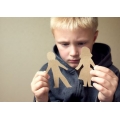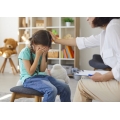On-Line
The following courses are 100% on-line and do not require a book to buy. You will be alerted of a missed answer and allowed to correct your answer. You must have acrobat reader to view your certificate.
#1 Great Reviews!
Course Description:
This course will identify factors that increase risk of aggression and violent acting out behaviors in individuals diagnosed with a mental health disorder. All disorders highlighted by the new DSM5, that correlate with a high risk of violence will be reviewed, including disorders that start in childhood and/or adolescence, which may vary over into adulthood. Also, identified will be biological, environmental, and psychosocial behavioral patterns that increase risk, plus explore the impact of co-occurring disorders on risk assessment. Targeted collaborative treatment interventions responsive to different levels of risk, diagnosis, and developmental stages will be identified.
Objectives:
- Identify mental health disorders and co-occurring disorders using the Diagnostic and Statistical Manual of Mental Disorders, fifth edition that pose a higher risk for aggression and violent behaviors.
- Identify biological, environmental and psychosocial behavioral patterns that increase risk for violence.
- Identify treatment interventions targeted to reduce or eliminate aggressive behaviors.
This course looks at a variety of case scenerios surrounding blended families.
"This was the best ethics course I've ever taken"- Pauline
Objectives:
- Understand how blended families are similar to and different from the traditional "intact" family.
- Learn about the integration process that blended families must achieve for optimal functioning.
- Identify seven ethical considerations in treating blended families.
- Learn to use a values-based approach to think through ethical dilemmas with this population
- Use five family therapy strategies when helping blended families integrate.
Meets Ethics requirements. This course will inform you on ethical issues that occur in clinical work with families, including divorce, custody conflicts, and boundary clarification in working with children, adolescents, adults, seniors, and guardians. Duty to warn responsibilities will be examined as they apply to domestic violence crisis. Responsibilities and duties of the clinician and the family will be covered. (booklet)
Objectives: Participants will be:
- Be familiar with the connection between values and ethics
- Aaware of of decision making steps and addressing ethical dilemmas
- Familiar with the requirements of informed consent
- Familiar with the NASW code of ethics concerning billing, fraud, honesty, conflict of interest, interruption of service privacy and confidentiality
Considerations in the treatment of post-deployment stress effects.
Objectives;
- Learn effective treatment responses
- Learn how the body responds to threat
- Understand the military culture
- Learn appropriate treatment considerations and deliveries
- Learn to use assessment instruments including suicide risk
- Learn ideas for re-balancing and self care
This on-line course is simple and straight forward to understanding the natural dying process. It will bring great comfort to careworkers in the Aging and Geriatrics field.
Objectives:
- Learn frequently asked questions from patients and family members
- Learn practical things that every family member should know
- Learn facts surrounding confusion and terminal restlessness
- Learn about the shutting down process of the natural dying process
- Learn the process of actively dying
- Learn important issues after the final death
Objectives:
- Define low risk drinking, at-risk drinking, problem drinking, and alcohol dependence in older adults
- Know drinking guidelines for adults age 65 and over
- Understand the prevalence of at-risk drinking, problem drinking, and alcohol dependence among older adults
- Identify signs and symptoms of alcohol problems in older adults
- Know how to use brief alcohol interventions with older adults
- Recognize barriers to intervention and treatment, and how to address them
Not only does the family influence the developmental course of alcohol use disorders, but the alcohol use disorders of individual family members influence the entire family's functioning and developmental outcomes of the system and its members.
Objectives:
-
Recognize a family systems perspective of alcohol use disorders;
-
Be familiar with family factors that increase or reduce risk of developing an alcohol use disorder;
-
Be familiar with family problems that may result from or co-occur with an alcohol use disorder;
-
Understand recent research concerning the relationship between family factors and recovery.
- Re-familiarized with the NASW Code of Ethics.
- Familiar with the connection between values and ethics.
- Aware of the decision-making steps in conceptualizing and addressing ethical dilemmas.
- Sensitized to the impact economic and racial conflicts have on social workers and clients.
- Familiar with the boundaries between appropriate relationships and dual relationships.
This is an introduction and suggested refresher course to Autism Spectrum Disorders.
Objectives:
- Overview of Autism Spectrum Disorder (ASD) and the problems that may come accompany ASD
- Overview of diagnosis and available aids for families
- Overview of adults with ASD
- Learn treatment options of Autism Spectrum Disorder
- Overview of causes and treatment of ASD
Mental Health Professionals MUST hold teachers and paras accountable for sticking up for kids who are bullied! Why do we think bullying will go away without adult intervention? The emotional effects can lead to suicide.
Objectives:
- Learn the needs of children who are bullied
- Learn why children may not report bullying
- Learn the role of mental health professionals and how to intervene
Take an inside look at a parents findings after logging into her 13 year old sons social website page for 6 months. You will learn how bullying has changed and learn how to stop it.
Objectives:
- View a parents "inside look" at what social website looks like.
- Learn the facts surrounding bullying.
- Learn about the data surrounding cyberbullying
- Learn the overall signs and effects of bullying
- Learn about intervention and prevention surrounding bullying
- Learn the role of school administrators and mental health professionals
This is a must read for all field workers and mental health professionals working in child abuse and neglect crisis intervention situations.
Objectives:
1.Understanding Crisis
2.Understand the elements of crises
3.Understand a workers vulnerability and safety measures
4.Learn burnout prevention tips
5.Learn crisis intervention goals and steps (Nine step model)
6.Learn treatment approaches and techniques including resistance
7.Understand common terms used in during crisis intervention
(NEW!)
Course Description
This easy to read course will enlighten every participant about the DSM5 and help you to make a competent diagnosis. Professionals will view the new changes which are intended to serve as a practical, functional, and flexible guide for organizing information that can aid in the accurate diagnosis and treatment of mental disorders.
Objectives:
• Look at the Concerns of the DSM5
• Evolution of DSM for teaching psychopathology
• Changes made to the DSM-5
• New Features in Each Diagnosis
Written by: David Jensen, PHD, LSCSW, LCMFT
This course summarizes what is known about young people and electronic aggression, provides strategies for addressing the issue with young people, and discusses the implications for professionals and parents.
Objectives
1. Define electronic aggression and uderstand the avenues of harassment
2. Learn the red flags and behaviors of victims
3. Review implications of electronic aggression
The course describes the ICRRC system of ethical processing, in which integrity, competence, responsibility, respect, and concern are considered to establish a rationale for making any decision.
Objectives: Participants will be:
- Familiar with the connection between values and ethics
- Aware of the decision making steps and addressing ethical dilemmas
- Aware of the boundaries between informed consent and self disclosure
- Familiar with the boundaries between confidentiality, duty to warn, and mandatory reporting
- Aware of boundaries and relationships
Objectives:
By the end of this module, learners should be:
- Familiar with literature relating alcohol issues to race, ethnicity, and culture;
- Knowledgeable about diverse patterns of alcohol use among individuals from various racial, ethnic, and cultural groups-differences between and among groups;
- Knowledgeable about the effects of alcohol on different groups and the factors associated with alcohol use among members of various groups;
- Prepared to provide effective alcohol intervention and prevention services by exploring strategies appropriate for use with members of varied racial, ethnic, and cultural groups.
Crisis Intervention begins at the first moment of contact with clients. Goals and implementation of those goals results in tremendous benefits to families.
Objectives:
1.Understand crisis intervention goals and steps as it relates to children
2.The importance of competent assessment when working with families
3.Understanding special family situations
4.Review the importance of follow up service
5.Review crisis intervention and safety measures
6. Learn important vocabulary and terms
The inability to part with ones belongings can get so out of control that it can become a personal crisis. The fascinating look into the lives of hoarders has hit TV and Media across the country. This course will help therapists have a better understanding of hoarding and how to treat it.
Objectives:
• Define the two types of hoarding
• Learn the facts and statistics of hoarding
• Learn common traits and causes of hoarding
• Learn intervention and treatment of hoarding
New! This is a must read for all mental health professionals. Seperate articles discuss medications as well as the importance of gun safety as it relates to mental health.
Objectives
1. Types of medications used to treat mental health disorders
2. Side effects of medications
3. Directions for taking medications
4. Warnings about medications from the FDA
5. Reducing gun violence
When in danger, it’s natural to feel afraid. This fear triggers many split-second changes in the body to prepare to defend against the danger or to avoid it. This “fight-or-flight” response is a healthy reaction meant to protect a person from harm. But in PTSD, this reaction is changed or damaged.
Objectives:
- Learn what post traumatic stress disorder (PTSD) is
- Learn the symptoms of PTSD
- Learn how PTSD is detected
- Learn how PTSD is treated
 Shopping Cart
Shopping Cart


















